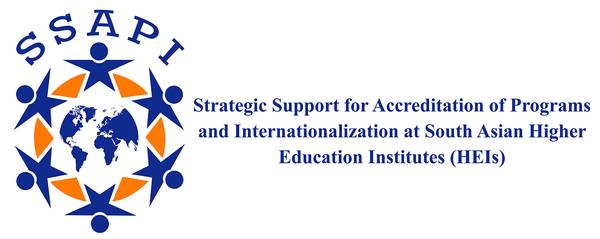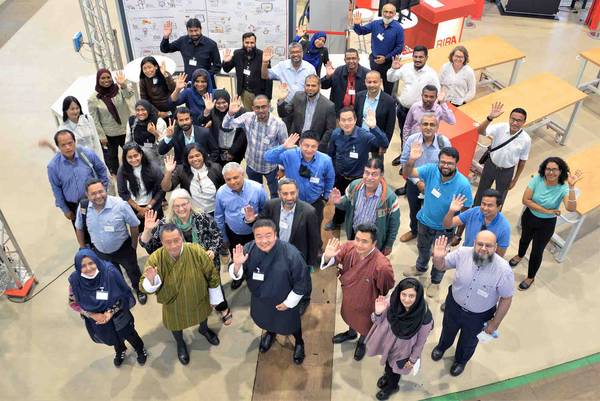
ERASMUS
Erasmus+ CBHE project SSAPI

Project Overview
The Erasmus+ Capacity Building (CBHE) project Strategic Support for Accreditation of Programs and Internationalization at South Asian Higher Education Institutes (HEIs) - SSAPI has been funded by the European Union. It started on January 15, 2021 and had a duration of three and a half years. It has been terminated successfully on July 14, 2024. Dr. Amir Qayyum, Capital University of Science and Technology (CUST), Pakistan, initiated and coordinated the project. The European partners were the University of Bremen (UniHB), particularly the IGS, and the University of Évora, Portugal. Eight further universities were partners in SSAPI. They were from Pakistan, Sri Lanka, Bhutan, and the Maldives. The CBHE aimed to create learning and practicing opportunities for partner country HEIs’ staff, including administrative staff, faculty, students, and researchers. Training focused on learning from EU partners and developing procedures to modernize the local education systems. This project contributed effectively to creating reforms in the overall higher education system of the partner universities. Due to the restrictions of the COVID-19 pandemic, the consortium decided in the beginning to make some adjustments to the initial work plan and added a phase of online training units to the training concept. The following measures have been implemented:
Preparation and Project Meetings
- The final meeting has been held in Islamabad, Pakistan, from June 1-5, 2024. The University of Bremen contributed online.
- From March 6-9, 2024, a project meeting in Thimphu, Bhutan, took place, in which Dr.-Ing. Ingrid Rügge took part as local project coordinator.
- A project meeting took place in Peradeniya, Sri Lanka, in which local project coordinator Dr.-Ing. Ingrid Rügge participated in in December 2023.
- In May and June 2023, Prof. Dr. Teresa Goncalves from the University of Evora stayed for a few days in Bremen to prepare for the upcoming training in Portugal.
- In Malé, the first SSAPI project meeting took place in February 2023, where Dr.-Ing. Ingrid Rügge joined in as local project coordinator for Bremen.
- Several face-to-face project meetings took place in Bremen in July 2022 because it was the first opportunity for some SSAPI partners to meet in person.
- The IGS implemented an extended questionnaire, which was evaluated and shared with all partners in December 2021 as an online form. The IGS analyzed the answers and provided feedback on the information to the partners. These digital assessments ended in February 2022.
- In October 2021, the local project coordinator, Dr.-Ing. Ingrid Rügge traveled to the second European partner, the University of Evora, Portugal, to analyze the input from the Asian partner HEIs and to develop an Action and Training plan.
- As a first step to gaining knowledge about the readiness for accreditation of programs of the partner HEIs, a questionnaire has been developed by the IGS by September 2021. Questions from various accreditation agencies were put together to create a detailed set of questions and topics to gather any information needed for accreditation from and for the Asian partner HEIs.
On-site Training in Asia
- In June 2024, Dr. Christian Peters, Managing Director of BIGSSS - Bremen International Graduate School of Social Sciences at the University of Bremen conducted training in Sri Lanka. The main topic has been Internationalisation, focusing on Artificial Intelligence in Higher Education. The training has been held onsite at SLTC and in hybrid mode at the University of Peradeniya (UoP) so that the SSAPI partners from other countries can join. With this online training, the University of Bremen closed its circle of providing training for accreditation and internationalization. It started in 2021 with three pieces of online training during the pandemic, conducted the first onsite training in Europe in 2022, continued with several demand-driven onsite training in 2022, 2023 and 2024 in all SSAPI partner institutions, and ended with some pieces of hybrid training in a partner university in Asia.
- Kay Burow of the University in Bremen, staff member at BIBA provided SSAPI training in April 2024 in Sri Lanka at the University of Peradeniya (UoP). Students and lecturers of SLTC, the second Sri Lankan partner, joined some sessions online.
- Following the project meeting in Bhutan, Prof. Dr. Teresa Goncalves, University of Evora, and Dr.-Ing. Ingrid Rügge, University of Bremen, held training on internationalization and accreditation at the Royal University of Bhutan (RUB) in Phuentsholing and at Khesar Gyalpo University of Medical Sciences of Bhutan (KGUMSB)Thimphu, in Bhutan in March 2024.
- In Peradeniya and Padukka, Sri Lanka, at the University of Peradeniya (UoP) and SLT Campus (SLTC), training was provided by Dr. Ing. Ingrid Rügge and Britta Schowe of the University of Bremen. It took place in December 2023.
- In October 2023, Prof. Dr. Walter Lang and Prof. Dr. Klaus-Dieter Thoben provided training in Bhutan in Phuentsholing, Thimphu, and other locations of both of the Bhutanese partners, Royal University of Bhutan (RUB) and Khesar Gyalpo University of Medical Sciences of Bhutan (KGUMSB)
- In September 2023, Dr. Tobias Sprodowski provided onsite training in Islamabad to all three partners, Capital University of Science and Technology (CUST), National University of Computer and Emerging Sciences (NUCES), and Riphah International University (RIU), in Pakistan.
- A few weeks after the training in Bremen, the first onsite training in Asia took place. The spokesman of the IGS, Prof. Dr. Aseem Kinra, joined a conference in Malé, Maldives, and provided training on teaching methods to both local partners, the Maldives National University (MNU) and Villa College (VC). In January 2023, a second training in Malé by another lecturer of the University of Bremen followed. Dr. Matthias Burwinkel is the Managing Director of the LogDynamics Lab and a staff member at BIBA. His training material has been translated into English and was shared internally with all SSAPI partners.
On-site Training in Europe
- The University of Bremen contributed to the on-site training in Evora, at the University of Evora, in July 2023 by sending three experts on accreditation and internationalization, Svenja Schell, Britta Schowe, and Dr.-Ing. Ingrid Rügge, to Portugal.
- In July 2022, it was possible to provide the first on-site training in Bremen - with only a few restrictions due to the COVID-19 pandemic. The IGS organized the event with 40 participants from all Asian SSAPI HEIs. Some further simulations of accreditation discussions took place, as well as workshops, visits to the library of UniHB, visits to several laboratories, internships in lectures and teaching units, as well as several guided tours to external destinations.
Online Training
- The trainings in April and June 2024 in Sri Lanka have been partly held in hybrid mode. Kay Burow shared the meeting with both Sri Lankan partners. Dr. Christian Peters included all SSAPI partners into the hybrid training.
- In June 2022, the IGS delivered another online training. Prof. Dr.‐Ing. habil. Klaus‐Dieter Thoben and Svenja Schell simulated a second accreditation discussion based on an example of another Asian partner. It was a Bachelor’s program in Industrial Engineering. All three units have been recorded. An excerpt of the recordings is internally available as training material for the SSAPI partners.
- Due to the COVID-19 pandemic, the IGS developed an online training format that simulates an accreditation visit. UniHB conducted three online trainings. Prof. Dr. Dr. h.c. Hans-Dietrich Haasis held the first training unit in March 2022 by giving an overview of different accreditation forms (program and institutional/system accreditations), introducing agencies, and simulating an accreditation discussion in the second online training. He used the documents of a Bachelor’s program of Business Administration and Management of one SSAPI partner as an example. Staff from all other SSAPI partner HEIs joined as listeners to learn and improve their answers.
Results
- Prof. Dr. Teresa Goncalves, University of Evora, Portugal, has visited the University of Bremen in July 2024 to work with Dr. Rügge to review the provided training pieces and develop recommendations for the Asian partners to sustain the European contribution.
- Prof. Dr. Anna Förster extends her network in Sri Lanka by visiting SLTC and UoP in February 2024 to discuss her research and excellent teaching methods.
- SSAPI contributed to the SKIMA conference to share the knowledge and experience gained on accreditation and internationalization with other Asian partners. The SKIMA conference was held in Malaysia from the 8th to the 10th of December, 2023.
- On the 19th of January, 2023, a delegation from Sri Lanka visited LogDynamics, the BIBA, and UniHB to explore the possibilities of further cooperation. It followed an Erasmus+ International Credit Mobility of two lecturers from SLTC in April/May/June.

- The first on-site meeting with all SSAPI partners, held in Bremen in July 2022
SSAPI (Strategic Support for Accreditation of Programs and Internationalization at South Asian Higher Education Institutes) is a project co-funded by the Erasmus+ Capacity Building Programme of the European Union: Project Ref No. 619438-EPP-1-2020-1-PK-EPPKA2-CBHE-JP
Disclaimer: This project has been funded with support from the European Commission. This website reflects the views only of the author, and the Commission cannot be held responsible for any use which may be made of the information contained therein.

